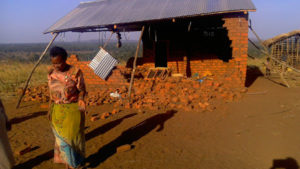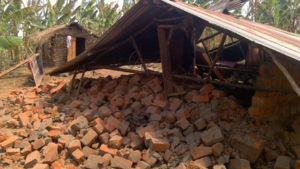 On September 10, 2016, an earthquake of magnitude 5.7 hit northern Tanzania and southern Uganda, with an epicenter near Lake Victoria. Dozens of people lost their lives, hundreds were injured and thousands more lost their homes. Unfortunately, this sad event was only minimally covered by the international news services. We just returned from our annual oversight visit to Uganda, where the Chairman of our Board of Directors, Ramona Walker, and I learned first-hand about the devastation that this earthquake caused in the Rakai district of Uganda. One of our schools is located in Rakai. Heroes Secondary School received one of our boreholes early in 2016 and fortunately neither the school nor its borehole sustained damage. But in a region just over the mountain from this school, the earthquake caused many houses and buildings to collapse. Hundreds of people are now sleeping outside under banana trees as their only shelter. Ssenkaali Godfrey, our first scholarship recipient and university graduate, is from one of the hardest hit parishes in Rakai. His family, as well as some of our colleagues in Rakai, lost their homes. Ssenkaali has been working to gather data on the number of injuries and houses lost, and he recently met with President Museveni when he came to Rakai to assess the damage. Here are three pictures to show you how the clay brick houses crumbled when the shaking began.
On September 10, 2016, an earthquake of magnitude 5.7 hit northern Tanzania and southern Uganda, with an epicenter near Lake Victoria. Dozens of people lost their lives, hundreds were injured and thousands more lost their homes. Unfortunately, this sad event was only minimally covered by the international news services. We just returned from our annual oversight visit to Uganda, where the Chairman of our Board of Directors, Ramona Walker, and I learned first-hand about the devastation that this earthquake caused in the Rakai district of Uganda. One of our schools is located in Rakai. Heroes Secondary School received one of our boreholes early in 2016 and fortunately neither the school nor its borehole sustained damage. But in a region just over the mountain from this school, the earthquake caused many houses and buildings to collapse. Hundreds of people are now sleeping outside under banana trees as their only shelter. Ssenkaali Godfrey, our first scholarship recipient and university graduate, is from one of the hardest hit parishes in Rakai. His family, as well as some of our colleagues in Rakai, lost their homes. Ssenkaali has been working to gather data on the number of injuries and houses lost, and he recently met with President Museveni when he came to Rakai to assess the damage. Here are three pictures to show you how the clay brick houses crumbled when the shaking began.
 Fortunately, the earthquake occurred during the day, when most people were out of their houses at work and school, so the number of injuries and deaths was not as great as it might have been. In Ssenkaali’s parish alone, 321 houses were completely destroyed, and 4032 houses sustained cracks and minor damage. Similar damage was sustained in four other parishes in the district. The government has promised to supply 30 corrugated tin roofing sheets, some iron reinforcement bars, and bags of cement for each house destroyed, but the residents still have to buy the bricks and water to frame the house, and pay builders to construct the walls and suspend the roof. In this region, poverty is extreme, and it is not clear how these people will find the money to rebuild.
Fortunately, the earthquake occurred during the day, when most people were out of their houses at work and school, so the number of injuries and deaths was not as great as it might have been. In Ssenkaali’s parish alone, 321 houses were completely destroyed, and 4032 houses sustained cracks and minor damage. Similar damage was sustained in four other parishes in the district. The government has promised to supply 30 corrugated tin roofing sheets, some iron reinforcement bars, and bags of cement for each house destroyed, but the residents still have to buy the bricks and water to frame the house, and pay builders to construct the walls and suspend the roof. In this region, poverty is extreme, and it is not clear how these people will find the money to rebuild.
It is so frustrating to see that the international press did not cover this disaster, which is similar in magnitude to destruction from earthquakes in other parts of the world. If this earthquake had occurred in Italy, Japan or Indonesia, it would have been all over the nightly news shows. Without international attention, the people in Rakai Uganda do not have access to help from international aid agencies.
If you sometimes wonder whether what you are doing to help us with our projects in Uganda is important, please know that you are doing a lot! You are directly helping Uganda develop, and its people to rise out of poverty. Our mission at Quench and Connect is not disaster relief, so we cannot help directly with reconstruction. But we can double our efforts to provide clean water to schools in Uganda, and to help these schools produce educated Ugandans who will bring Uganda to its deserved place on the world stage.